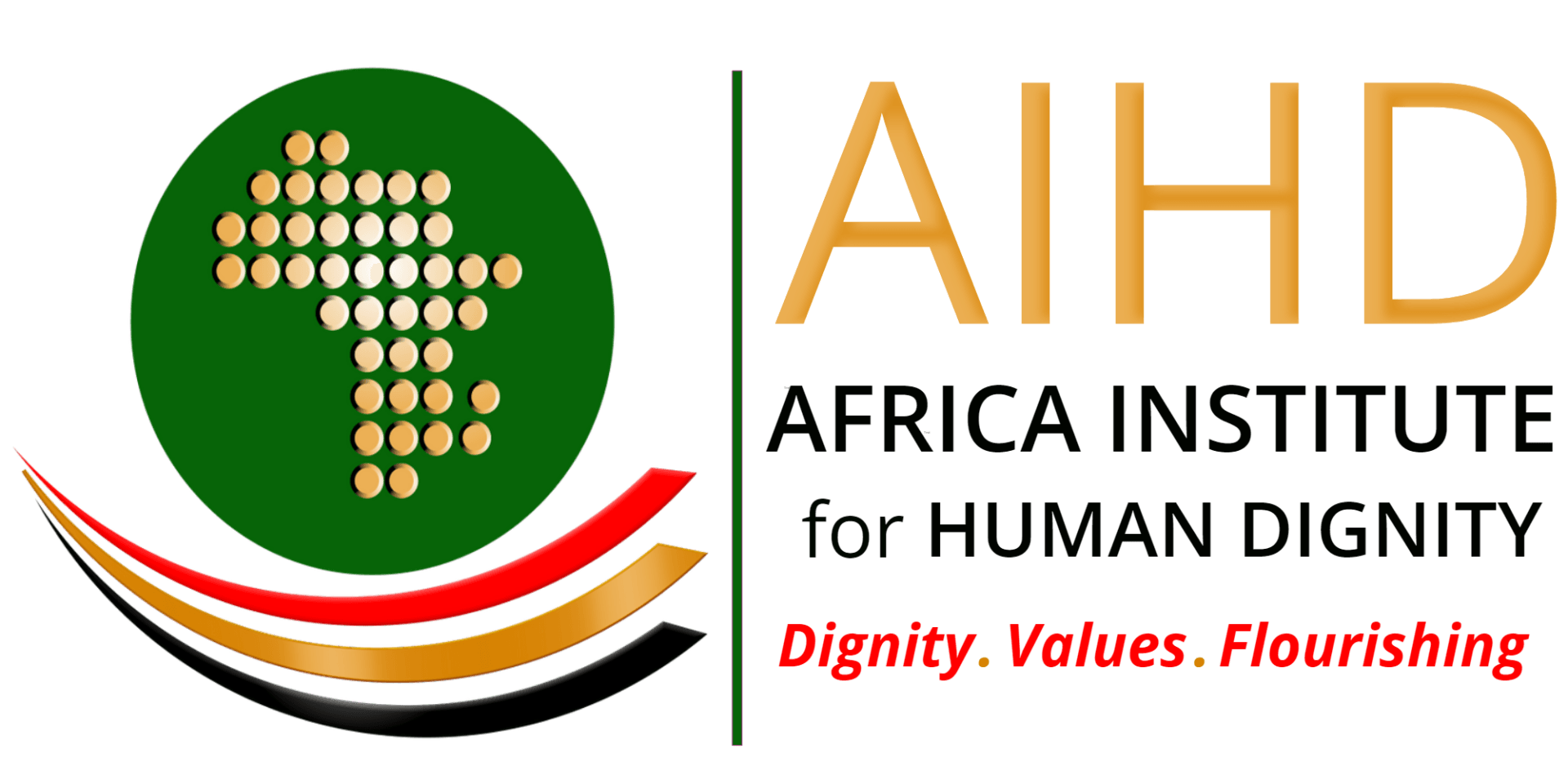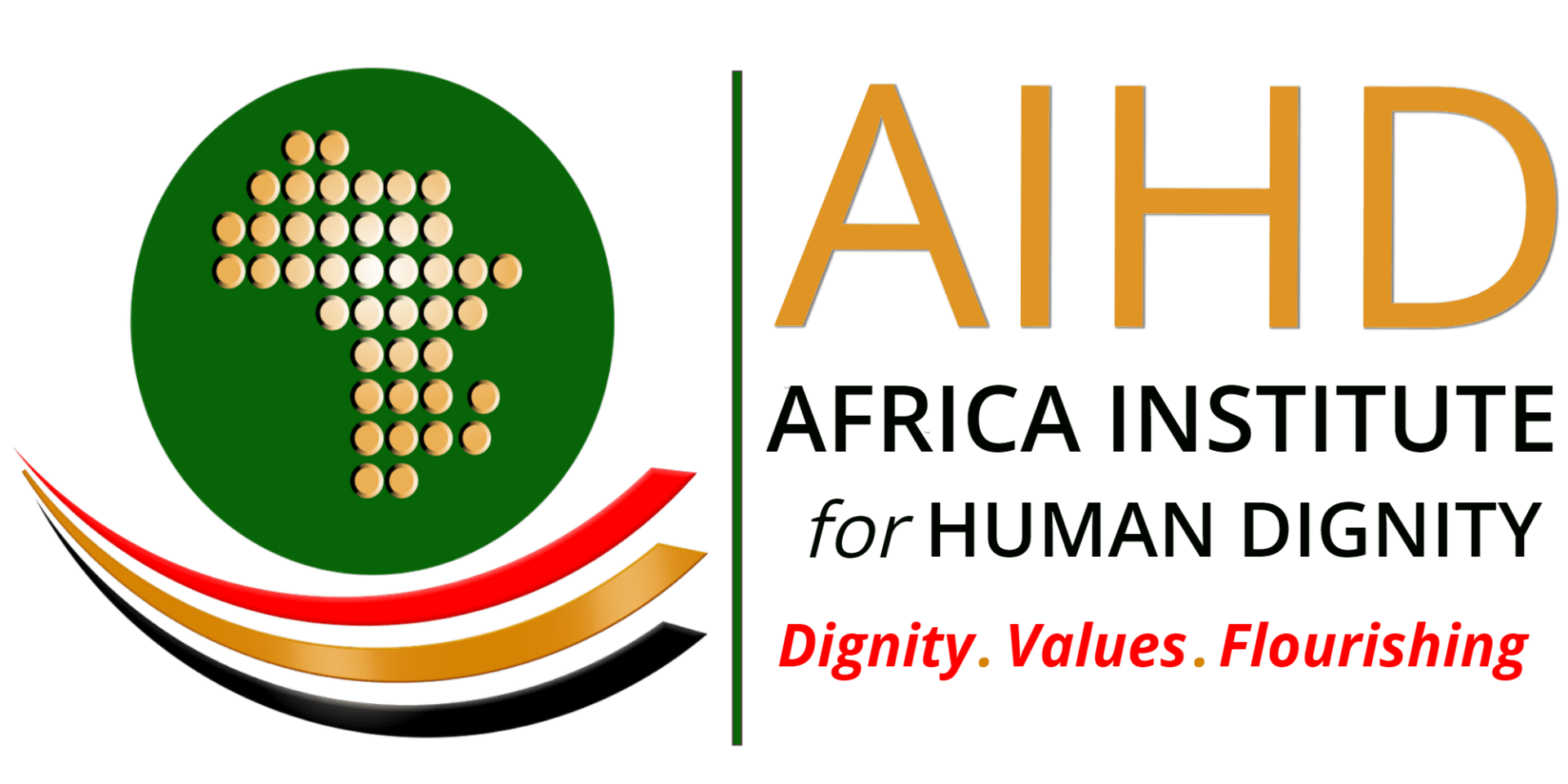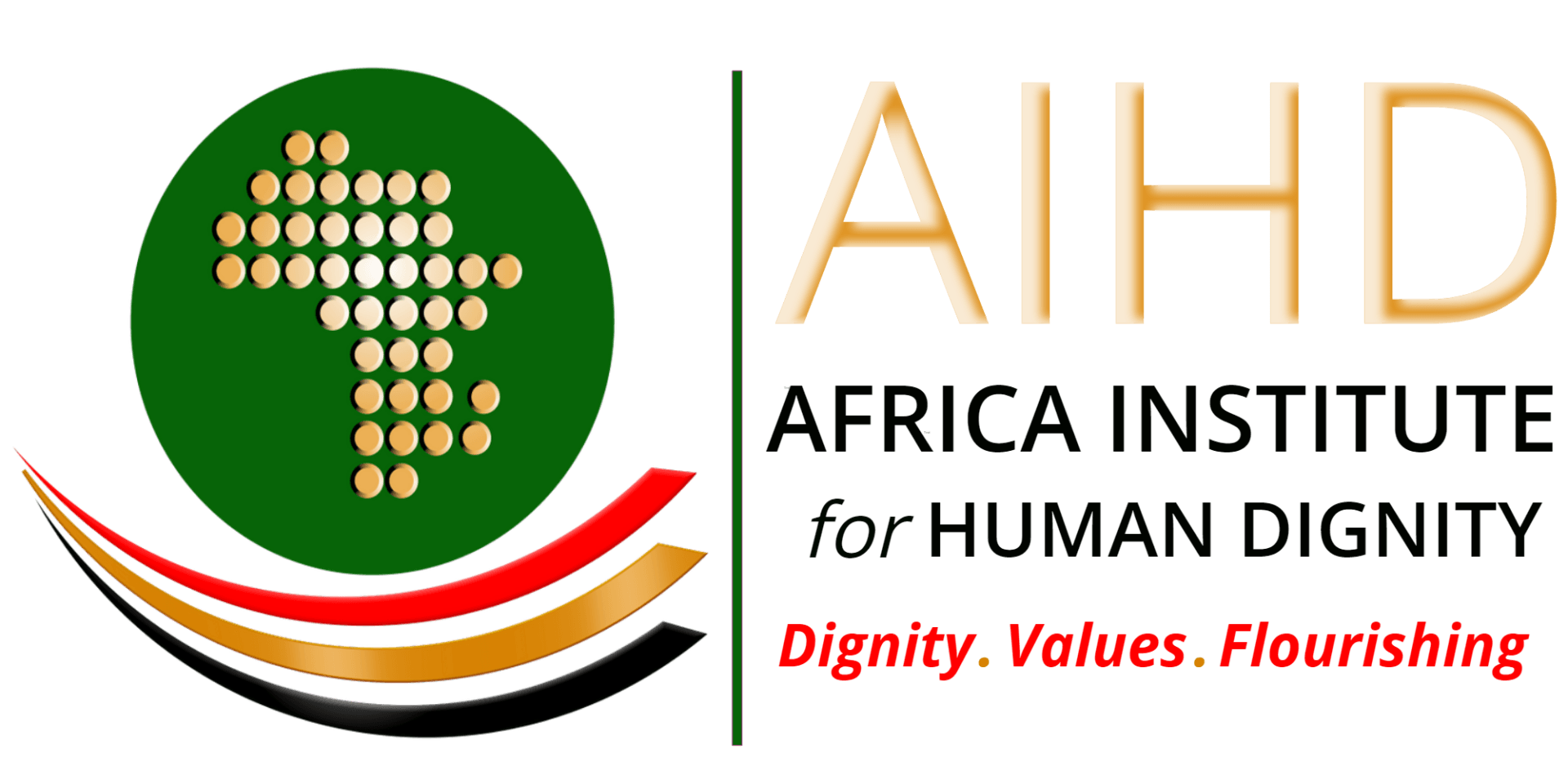Research & Publications

Research Themes
AIHD’s main objective is to undertake rigorous and impactful research on contemporary African thought on the dignity of the human person, human values and human flourishing, through its network of distinguished researchers and scholars. Such research may be directly initiated by AIHD; or commissioned to AIHD by individuals, organisations and governments; or in collaboration with other research institutes and organisations.
AIHD research themes include:
(I) THE CONCEPT OF HUMAN DIGNITY IN CONTEMPORARY AFRICAN THOUGHT
The dignity of the human person essentially denotes the inalienable intrinsic value of the human being, which arises from simply belonging to the natural kind of embodied rational nature constituting the human person (Lee & George, 2008).
Human dignity is an ordinary human experience, which becomes more evident whenever it is denied. Research sub-themeson the concept of human dignity in contemporary African thought include (in alphabetical order):- Artificial intelligence and human dignity
- Being (existence and essence)
- Denial of human dignity
- Gender and gender dynamics
- Human dignity and human rights
- Human dignity and national constitutions
- Human freedom and moral agency
- Human identity, uniqueness and relationality
- Human nature
- Natural law
- Normativity and the contemporary crisis of normativity
- Personhood
- Spirituality
- The concept of human dignity
- The concept of human dignity in education and school curricula
- The human good
- The polymorphism of consciousness
- The sanctity of human life
- The ultimate good
- Ubuntu/ botho/ obuntubulamu/ utu/…
- …
(I) THE CONCEPT OF HUMAN DIGNITY IN CONTEMPORARY AFRICAN THOUGHT
The dignity of the human person essentially denotes the inalienable intrinsic value of the human being, which arises from simply belonging to the natural kind of embodied rational nature constituting the human person (Lee & George, 2008).
Human dignity is an ordinary human experience, which becomes more evident whenever it is denied. Research sub-themes
on the concept of human dignity in contemporary African thought include (in alphabetical order):
- Artificial intelligence and human dignity
- Being (existence and essence)
- Denial of human dignity
- Gender and gender dynamics
- Human dignity and human rights
- Human dignity and national constitutions
- Human freedom and moral agency
- Human identity, uniqueness and relationality
- Human nature
- Natural law
- Normativity and the contemporary crisis of normativity
- Personhood
- Spirituality
- The concept of human dignity
- The concept of human dignity in education and school curricula
- The human good
- The polymorphism of consciousness
- The sanctity of human life
- The ultimate good
- Ubuntu/ botho/ obuntubulamu/ utu/…
- …
(II) HUMAN VALUES IN CONTEMPORARY AFRICAN THOUGHT
The dignity of the human person is the basis of all genuine human values. Authentic human values are the transcendent notion of the true human good, whose end is the holistic bio-psycho-social and spiritual well-being of individuals in a society. Values are derived through a verifiable deliberative value-judgement process that is normative, immutable and immanent in human consciousness (Lonergan, 1972). Research sub-themes on human values in contemporary African thought include (in alphabetical order):- African cultural heritage and acculturation
- African history and historical consciousness
- Beauty and art
- Bioethics
- Business ethics
- Charity
- Common morality
- Common sense
- Communitarianism and libertarianism
- Democracy
- Dialogue
- Environmental conservation
- Ethno-philosophy
- Family ethics
- Faith and reason
- Faith, religion, superstition and secularisation
- Gender ethics
- History and historical consciousness
- Human rights and responsibilities
- Identity, in-group dynamics and xenophobia
- Intellectual humility
- Justice
- Knowledge and knowing
- Law and order
- Leadership
- Leisure
- Literature
- Moral relativism
- Normativity and the contemporary crisis of normativity
- Personal autonomy
- Person-centredness
- Philosophic pluralism
- Political systems
- Science and technology
- Secularism
- Social norming
- Spirituality
- The common good
- The concept of human values
- The concept of human values in education and school curricula
- The family and family dynamics
- The human good
- The sanctity of human life
- The ultimate good
- Ubuntu/ botho/ obuntubulamu/ utu/ …
- Virtue and ‘after virtue’
- …
(II) HUMAN VALUES IN CONTEMPORARY AFRICAN THOUGHT
The dignity of the human person is the basis of all genuine human values. Authentic human values are the transcendent notion of the true human good, whose end is the holistic bio-psycho-social and spiritual well-being of individuals in a society. Values are derived through a verifiable deliberative value-judgement process that is normative, immutable and immanent in human consciousness (Lonergan, 1972). Research sub-themes on human values in contemporary African thought include (in alphabetical order):
- African cultural heritage and acculturation
- African history and historical consciousness
- Beauty and art
- Bioethics
- Business ethics
- Charity
- Common morality
- Common sense
- Communitarianism and libertarianism
- Democracy
- Dialogue
- Environmental conservation
- Ethno-philosophy
- Family ethics
- Faith and reason
- Faith, religion, superstition and secularisation
- Gender ethics
- History and historical consciousness
- Human rights and responsibilities
- Identity, in-group dynamics and xenophobia
- Intellectual humility
- Justice
- Knowledge and knowing
- Law and order
- Leadership
- Leisure
- Literature
- Moral relativism
- Normativity and the contemporary crisis of normativity
- Personal autonomy
- Person-centredness
- Philosophic pluralism
- Political systems
- Science and technology
- Secularism
- Social norming
- Spirituality
- The common good
- The concept of human values
- The concept of human values in education and school curricula
- The family and family dynamics
- The human good
- The sanctity of human life
- The ultimate good
- Ubuntu/ botho/ obuntubulamu/ utu/ …
- Virtue and ‘after virtue’
- …
(III) HUMAN FLOURISHING IN CONTEMPORARY AFRICA
Re-affirming and safeguarding the dignity of the human person is the key to genuine human flourishing. Human flourishing consists in the rightful pursuit of the human good towards holistic well-being or human fulfilment. It is vital to note that human flourishing is conditionalon optimal societal determinants. Research sub-themes on human flourishing in contemporary Africa include (in alphabetical order):- Africa's Agenda 2063
- African history and historical consciousness
- Artificial intelligence
- Beauty and art
- Bioethics in Africa
- Biotechnology
- Brain drain
- Capitalism
- Charity
- Climate change
- Communication and information technology
- Communitarianism and libertarianism
- Conflict and peace
- Corruption, anti-corruption and corruption intolerance
- Cultural institutions
- Democracy
- Denial of human dignity
- Dialogue and consunsus-building
- Disaster management
- Economic development
- Education and human development
- Employment, unemployment and labour laws
- Entertainment
- Entrepreneurship and good business practice
- Environmental conservation
- Faith, religion, superstition and secularisation
- Family dynamics
- Family ethics
- Food and water sufficiency
- Gender dynamics
- Gender ethics
- Gender-based violence
- Globalisation
- Good governance
- Health and health care
- Homelessness
- Human happiness and fulfilment
- Human rights and responsibilities
- Justice, fairness and equal opportunity
- Knowledge and knowing
- Land and housing
- Law and order
- Leadership and leadership training
- Leisure
- Marginalised populations
- Migration, immigration and emigration
- Music, dance and drama
- Natural resources and economic development
- Neo-colonialism
- Political systems
- Population dynamics
- Poverty and poverty alleviation/ eradication
- Psychic decolonisation
- Public health emergency preparedness and response
- Racism
- Rural and urban development
- Science and technology
- Social media
- Solidarity
- Spirituality
- Sport
- Subsidiarity
- Sustainable development goals
- Terrorism and anti-terrorism
- The common good
- The concept of human flourishing
- The sanctity of human life
- The youth
- Trans-generational dynamics
- Truth and reconciliation
- Ubuntu/ botho/ obuntubulamu/ utu/…
- Virtue
- …
(III) HUMAN FLOURISHING IN CONTEMPORARY AFRICA
Re-affirming and safeguarding the dignity of the human person is the key to genuine human flourishing. Human flourishing consists in the rightful pursuit of the human good towards holistic well-being or human fulfilment. It is vital to note that human flourishing is conditional
on optimal societal determinants. Research sub-themes on human flourishing in contemporary Africa include (in alphabetical order):
- Africa's Agenda 2063
- African history and historical consciousness
- Artificial intelligence
- Beauty and art
- Bioethics in Africa
- Biotechnology
- Brain drain
- Capitalism
- Charity
- Climate change
- Communication and information technology
- Communitarianism and libertarianism
- Conflict and peace
- Corruption, anti-corruption and corruption intolerance
- Cultural institutions
- Democracy
- Denial of human dignity
- Dialogue and consunsus-building
- Disaster management
- Economic development
- Education and human development
- Employment, unemployment and labour laws
- Entertainment
- Entrepreneurship and good business practice
- Environmental conservation
- Faith, religion, superstition and secularisation
- Family dynamics
- Family ethics
- Food and water sufficiency
- Gender dynamics
- Gender ethics
- Gender-based violence
- Globalisation
- Good governance
- Health and health care
- Homelessness
- Human happiness and fulfilment
- Human rights and responsibilities
- Justice, fairness and equal opportunity
- Knowledge and knowing
- Land and housing
- Law and order
- Leadership and leadership training
- Leisure
- Marginalised populations
- Migration, immigration and emigration
- Music, dance and drama
- Natural resources and economic development
- Neo-colonialism
- Political systems
- Population dynamics
- Poverty and poverty alleviation/ eradication
- Psychic decolonisation
- Public health emergency preparedness and response
- Racism
- Rural and urban development
- Science and technology
- Social media
- Solidarity
- Spirituality
- Sport
- Subsidiarity
- Sustainable development goals
- Terrorism and anti-terrorism
- The common good
- The concept of human flourishing
- The sanctity of human life
- The youth
- Trans-generational dynamics
- Truth and reconciliation
- Ubuntu/ botho/ obuntubulamu/ utu/…
- Virtue
- …
Current Research
Updating soon.
What You Can Do
Become a Member
Research & Publications
Donate
News & Upcoming Events
Blog
Photo Gallery
Jobs at AIHD
Contact Us
Contact Information:
Plot 16739, Depenqa Road,
Gaborone-West Phase 1, Gaborone
P O
Box 601977, Gaborone, Botswana
Tel:
+267 3164811/ +267 71612900
Email:
info@humandignityafrica.com
Website:
www.humandignityafrica.com
Website by Eazi-Sites. Licence owned and operated by MM Bonna | © Africa Institute for Human Dignity 2020. All Rights Reserved | Privacy Policy



